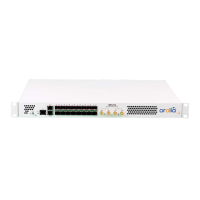_gpa_prm_call_trigger_on_warning:852:
'(2.1002.2)alert/timing_state' changes to a warning value: Warning
As can be seen, the log event is divided in the following parts:
Timestamp: It shows the date and time of the event information
DevID: It shows the device identification (hostname)
Facility/Level: It shows the type of program which is logging
Module: It shows the name of the internal module that generated the logging
Message: It shows information about the event
7.1.2 Permanent logs
The devices keep a permanent log to maintain the system information in case of unex-
pected reboots. This information is saved during the reboot process and can be found at
/root/.log/reboot/.
.last_reboot: It contains the timestamp of the last reboot
wrz-xxx-xxx-xxxx-xxx.logdump: It contains the output of the wrz_logdump at the
moment of the reboot
7.1.3 Remote logs
The devices can be configured to forward the system log information to a remote cent-
ralized server. This server needs to be configured by the user so it supports rsyslog. Saving
information into the device normally is not practical for huge deployments, so it is recom-
mended to set-up a rsyslog server and store the logging in a different machine, centralizing
the logging for all devices in the deployment. The device can connect to up to 2 servers for
this purpose, listed as Server 1 and Server 2.
7.1.4 Logging tools
By default, the device uses three tools to manage the internal logging tasks:
Collectd
Collectd is a program which runs in background collecting some metrics about the system
and applications performance. These measures are saved in the RRD format, which can be
used as input of rrdtools.
RRD databases can be found at /var/lib/collectd/rrd/<hostname> and include inform-
ation about the CPU, the management interfaces, the memory, etc.
7.1 Syslog
CHAPTER 7 • WR-Z16 User Manual Rev. v3.4
97

